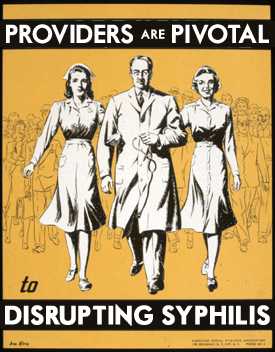Women and Children Deserve the Best Health Possible

Syphilis may be making a comeback, but there are actions we can take and resources we can use to help reduce its impact. This page includes specific prevention information for women, pregnant women, and healthcare providers, as well as information on how syphilis is affecting women, pregnant women, and newborns.
Syphilis increased among women in recent years. Disturbingly, it has also increased among pregnant women and newborns.
What is congenital syphilis (CS)?
A disease that occurs when a mother with syphilis passes the infection on to her baby during pregnancy.
How can CS affect my baby?
 CS can have major health impacts on your baby. How CS affects your baby’s health depends on how long you had syphilis and if — or when — you got treatment for the infection.
CS can have major health impacts on your baby. How CS affects your baby’s health depends on how long you had syphilis and if — or when — you got treatment for the infection.
CS can cause:
- Miscarriage (losing the baby during pregnancy),
- Stillbirth (a baby born dead),
- Prematurity (a baby born early),
- Low birth weight, or
- Death shortly after birth.
Up to 40% of babies born to women with untreated syphilis may be stillborn, or die from the infection as a newborn.
What Women Can Do to Prevent Syphilis
Knowledge is key! Know what puts you at risk and how to avoid and/or lower those risks. The only way to avoid getting syphilis or other STDs is to not have anal, oral, or vaginal sex.
 If you are sexually active, here are some ways to lower your chances of getting syphilis:
If you are sexually active, here are some ways to lower your chances of getting syphilis:
- Be in a long-term mutually monogamous relationship with a partner who has been tested and has negative STD test results.
- Reduce your number of sex partners; however, it’s still important that you and your partner get tested, and that you share your test results with one another.
- Use latex condoms the right way every time you have sex. Condoms prevent the spread of syphilis by preventing contact with a sore. Sometimes sores can occur in areas not covered by a condom, so you could still get syphilis from contact with these sores, even if you are wearing a condom.
Talk about it! Silence helps to fuel the spread of STDs.
- Have an honest and open talk with your healthcare provider about your sexual history and ask whether you should be tested for syphilis or other STDs. There are resources on finding an LGBT-friendly healthcare provider.
- Talk with your partner about sex and STDs BEFORE you have sex.
If you test positive, syphilis can be treated with the right medicine from your healthcare provider. It’s also important that your sex partner receives treatment. Even after you’ve been successfully treated, you can still get syphilis again. For this reason you must continue to take actions that will lower your risk of getting infected again.
Additional steps are needed to protect you and your baby if you are pregnant.
What Pregnant Women Can Do to Protect Their Health and Their Baby's Health
 If you are pregnant, you should be tested for syphilis the first time you see your doctor for healthcare during pregnancy. If you don’t get tested at your first visit, make sure to ask your doctor about getting tested during a future checkup. An overview of other STD testing recommendations is available. Your doctor may want to test you again later in your pregnancy and again when your baby is born depending on your risk for infection.
If you are pregnant, you should be tested for syphilis the first time you see your doctor for healthcare during pregnancy. If you don’t get tested at your first visit, make sure to ask your doctor about getting tested during a future checkup. An overview of other STD testing recommendations is available. Your doctor may want to test you again later in your pregnancy and again when your baby is born depending on your risk for infection.
If you test positive for syphilis, you will need to be treated right away. Don’t wait for your next visit. Medicine used to cure syphilis is safe for you and your baby to receive during pregnancy.
It’s also important that your sex partner receives treatment.
What Healthcare Providers Can Do to Protect Their Women Patients/Pregnant Patients
Diagnosing and treating syphilis can be complicated. If you have questions, follow-up with your state or local health department or a local infectious disease doctor. We also have several other resources to help.
 YOU PLAY A PIVOTAL PART IN PREVENTING SYPHILIS – by keeping your patient safe, their baby safe if they’re pregnant, and by stopping further transmission of syphilis within the community.
YOU PLAY A PIVOTAL PART IN PREVENTING SYPHILIS – by keeping your patient safe, their baby safe if they’re pregnant, and by stopping further transmission of syphilis within the community.
For sexually active patients:
- Take a routine sexual history to determine her risk and what tests may be needed.
- Talk with her about prevention methods.
There are specific recommendations for women who are pregnant or who have just given birth:
- Screen all pregnant women for syphilis at their first prenatal visit. Some women may be in the asymptomatic stage of syphilis. Women without symptoms can still spread the infection to their unborn babies.
- Women at high risk should be rescreened early in their third trimester and again at delivery. This includes women with a history of syphilis infection, incarceration, drug use, [or] multiple or concurrent partners, and those who live in areas with high rates of syphilis.
- Before discharging any newborn infant from the hospital, make sure that the mother has been tested for syphilis at least once during her pregnancy or at delivery. If the test is positive, ensure that the mother and baby are evaluated appropriately before discharge and, if necessary, treated. Also, if a woman delivers a stillborn infant, she should be tested for syphilis.
If your patient is diagnosed with syphilis, take immediate action. Pregnant women diagnosed with syphilis should be treated with benzathine penicillin immediately. Treatment at least 30 days prior to delivery is likely to prevent congenital syphilis. Also, all cases of syphilis and congenital syphilis should be reported to your state or local health department right away. CDC recommends reporting within 24 hours.
Always advise your patient to tell her sex partner or partners about their diagnosis and encourage them to get tested and treated to avoid reinfection.
Syphilis By The Numbers: Women, Pregnant Women, and Newborns
Overall
- Women accounted for about 1 in 10 syphilis cases in 2015, or 2,298 total cases.
- The syphilis rate increased 27.3% among women from 2014-2015.
Pregnant Women and Newborns
- Pregnant women: National data show a 25% increase in syphilis among pregnant women from 2012-2014. In 2014, nearly 1 in 5 women with syphilis were pregnant.
- Nearly half of all syphilis cases were among black pregnant women in 2014; the largest increases were among American Indians/Alaska Natives and whites.
- Newborns: After a steady decline from 2008–2012, data show a sharp increase in the rate of congenital syphilis. In 2015, the number of congenital syphilis cases was the highest it’s been since 2001.
- Page last reviewed: March 13, 2017
- Page last updated: March 13, 2017
- Content source:



 ShareCompartir
ShareCompartir